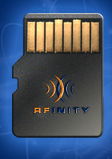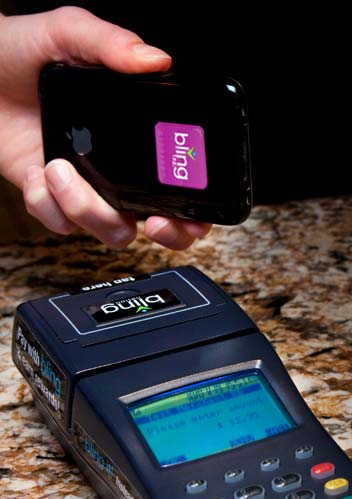M-Payment Start-Up Trades MicroSDs for Passive Stickers

U.S.-based mobile-payment start-up RFinity is adopting passive-contactless stickers for its payment project in and around a university campus in Idaho, changing an earlier plan to expand its pilot using contactless microSD cards.
The company also appears to be adopting an m-payment model similar to that of U.S.-based Bling Nation, which signs up community banks and targets local merchants to participate in a closed-loop payment system using its own processing network. RFinity has used the university's closed network and probably will use the automated-clearinghouse network to avoid credit and debit card interchange fees. RFinity and Bling are among a host of start-ups hoping to take businesss from Visa Inc., MasterCard Worldwide and major banks in the budding mobile-payment market.
RFinity expanded its trial last month, with its first bank, Citizens Community Bank of Idaho, and the university issuing 1,600 contactless stickers over the past month. The trial has also expanded to five merchants outside of the Idaho campus of Utah-based Brigham Young University, including a pizza restaurant and sandwich shop, in addition to the campus bookstore.
The first phase of the trial began around August 2009, with 128 students and staff at the university issued microSD cards with external antennas. Early this year, the trial moved to a second, smaller, phase–with a handful of the trial participants issued an additional microSD card. But these cards came with tiny embedded antennas–probably the first such test with real consumers of microSDs with self-contained contactless antennas.
 Germany-based Giesecke & Devrient produced both types of microSDs, which supported RFinity security features, including a cryptographic processor and authentication system designed to run on the cards. The company said keeping the security features on the cards cut security risks. The cards also were key to RFinity’s plans for a peer-to-peer payment service, which would have enabled users to tap phones to exchange funds. But it's unlikely the microSD cards supported full NFC, including NFC's P2P mode.
Germany-based Giesecke & Devrient produced both types of microSDs, which supported RFinity security features, including a cryptographic processor and authentication system designed to run on the cards. The company said keeping the security features on the cards cut security risks. The cards also were key to RFinity’s plans for a peer-to-peer payment service, which would have enabled users to tap phones to exchange funds. But it's unlikely the microSD cards supported full NFC, including NFC's P2P mode.
“The reason for moving to the sticker was cost,” RFinity CTO and interim CEO Steve McCown told NFC Times. He estimated the stickers cost $1 to $3 apiece, a small fraction of the cost of the contactless microSDs.
Besides the lower costs, the less-sophisticated passive stickers can work with nearly all mobile phones, he said. While he said the tests with the contactless microSDs went well, the cards with the external antennas created some problems depending on the orientation of the microSD slots in the phones. Users were supposed to wrap the antennas around the phone batteries.
The passive stickers, however, have no direct connection with the application processors or user interface of the phones. It was unclear whether RFinity intends to send transaction alerts via SMS as Bling Nation does after users tap their stickers to pay.
 RFinity does appear to be following Bling's model. The latter has signed up at least a dozen community banks in Colorado and New York, among perhaps two or three other states for its closed-loop payment scheme. It uses contactless stickers, called BlingTags, to initiate transactions with local merchants. The funds are withdrawn from consumers’ bank accounts and transferred to the merchants' banks over its own network. According to Bling, a given consumer's account is usually at the same bank as that of the merchant, since Bling entices merchants to set up accounts at its partner banks. RFinity is looking to sign up more community banks and rejects the idea the payment system is closed-loop, since it is open to all banks.
RFinity does appear to be following Bling's model. The latter has signed up at least a dozen community banks in Colorado and New York, among perhaps two or three other states for its closed-loop payment scheme. It uses contactless stickers, called BlingTags, to initiate transactions with local merchants. The funds are withdrawn from consumers’ bank accounts and transferred to the merchants' banks over its own network. According to Bling, a given consumer's account is usually at the same bank as that of the merchant, since Bling entices merchants to set up accounts at its partner banks. RFinity is looking to sign up more community banks and rejects the idea the payment system is closed-loop, since it is open to all banks.
With Citizens Community Bank of Idaho, students and other participants in the RFinity project attach the stickers to their mobile phones or other devices, then tap at point-of-sale terminals equipped with contactless readers. To complete transactions, users have to enter PIN codes on POS-terminal keypads. This and other encrypted transaction data goes to RFinity’s server, which submits the debit transaction requests to the bank to verify funds are in the consumers’ accounts. The system then initiates the transfer to the merchant bank. McCown said the transaction takes a couple of seconds. Like Bling, the lower fees compared with credit or debit cards encourage merchants to offer discounts, loyalty points or product givaways, he said.
McCown also rejects the idea that contactless payment should only be used for low-value transactions and that consumers should not enter PINs–as is the case with contactless applications from Visa and MasterCard in many countries. Users must enter a PIN when conducting RFinity transactions for any amount, with the maximum amount set by the bank. At present, that’s up to $500 for a single transaction, with a cap of $500 per day. And RFinity adds other security measures.
“We have chosen to be a little bit more conservative,” said McCown.
That is in part a consequence of his past job with the U.S. Department of Energy’s Idaho National Lab, where among other things he tested cell phones for security vulnerabilities. Aaron Turner, RFinity’s former CEO and a co-founder with McCown, was also at the Idaho National Lab, but has since left RFinity. The start-up last year had a reported commitment of more than $10 million in funding from venture capital connected with Hong Kong-based Horizons Ventures. McCown declines to release full funding figures.
RFinity also has developed a peer-to-peer payment application that does not use microSD cards. McCown said the application would enable transactions that behave like NFC-based P2P transactions. He said the company expects to release the application in coming weeks and declined to release more details.
RFinity would move its payment service to NFC phones when they become more widely available. The company also has not abandoned contactless microSD cards. These cards will become more attractive when prices fall as volumes increase, McCown said.
It remains to be seen whether such alternative mobile-payment schemes as those from RFinity and Bling can take on Visa and MasterCard and the big banks. The latter are also starting to issue passive stickers, though carrying open-loop payment applications. And all parties are waiting for more contactless microSDs and NFC phones to hit the market.












